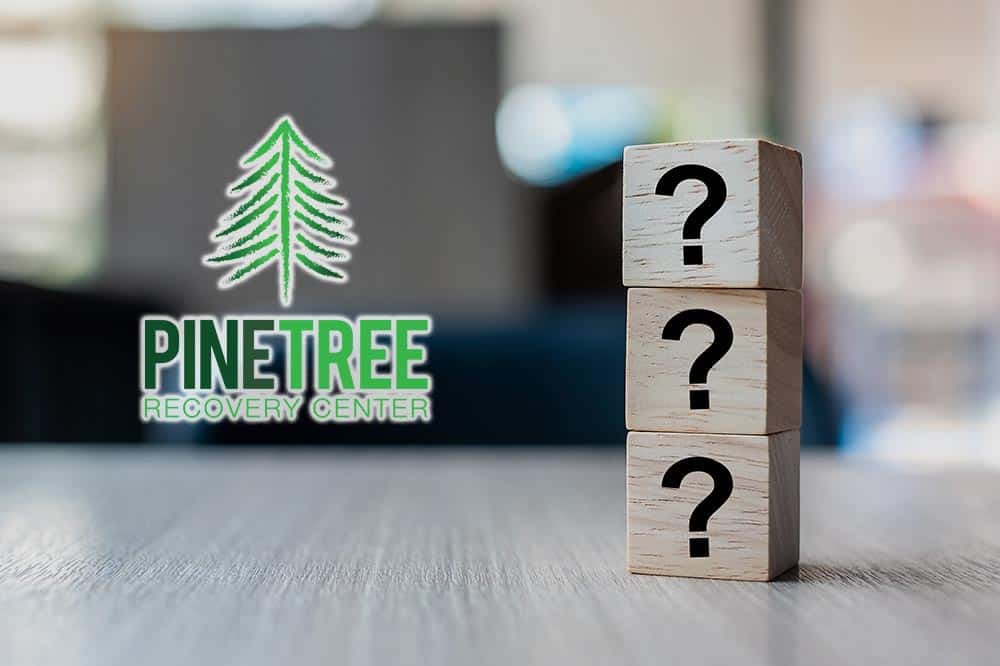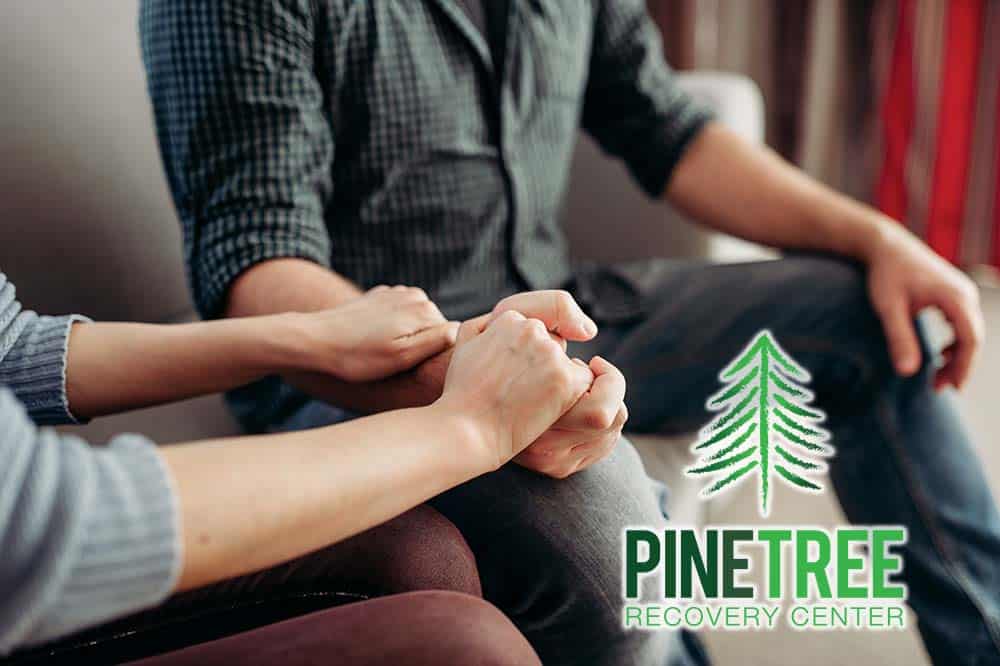Drug & Alcohol Addiction Signs & Symptoms
Am I Addicted?
Am I Addicted?
What is addiction, and how can you tell if you’ve been struggling with a diagnosable substance use disorder? Addiction is a chronic health condition; one which can always be effectively treated if the appropriate measures are taken. If your substance use has gotten out of hand you might be wondering if you’re actually an addict, or if you simply need to reign things in a little bit. If you have attempted to quit on your own with little to no success, or if you have started to experience a range of personal consequences as the result of your substance use, professional intervention might be necessary. However, this doesn’t necessarily mean you need to commit to a three-month stay in a residential inpatient treatment center. Addiction looks different for different people, and your personal recovery journey should always be custom-tailored to your individual clinical needs. At Pine Tree Recovery Center we provide personalized treatment options to those who have been struggling with addictive disorders of all types and severities. Contact us today to learn more about the treatment services we provide or to begin your own personal journey of addiction recovery.
How Can You Tell If You Are Experiencing Drug & Alcohol Addiction?
When it comes to substance misuse and dependence, it can be pretty tricky to diagnose yourself. Why? First of all, addiction often involves some degree of denial. Even if you have been suffering a range of consequences at the hands of your substance use, you might struggle to admit drugs and alcohol have become a problem. You might tell yourself things like, “I can stop whenever I want to, I just don’t want to at the moment.” Or, “Maybe I’ve been drinking a little too much, but it’s really no one’s business how much I drink.” Even if substance use has clearly become a problem it can be easy to convince yourself otherwise. If you are on the fence about reaching out for help we recommend you take a closer look at the warning signs associated with addiction. If you have any additional questions you are welcome to reach out to us directly.
Physical Signs of Addiction
If you believe your substance use has started to get out of hand, there are several physical signs and symptoms of addiction to keep an eye out for.
Physical Signs of Alcohol Use Disorder
If you have been struggling with an alcohol use disorder, you might:
- Commonly experience the symptoms associated with a hangover — nausea, vomiting, headaches, sluggishness and general feelings of physical discomfort.
- Start to feel shaky or anxious when you don’t have alcohol readily accessible.
- Feel sluggish and unmotivated throughout the day.
- Experience changes to your regular sleeping or eating patterns.
We Are Here For You
Physical Signs of Opioid Use Disorder
If you have been misusing a prescription opioid like oxycodone, hydrocodone or codeine, or if you have been using an illicit opioid like heroin, you are likely experiencing some (or all) of the following physical symptoms:
- Excessive drowsiness throughout the day.
- Nausea, vomiting and a loss of appetite.
- Significantly reduced sex drive.
- Quickly developing a physical tolerance.
- The presence of flu-like symptoms.
- Excessive yawning throughout the day.
Physical Signs of Benzodiazepine Use Disorder
Benzodiazepines like Xanax, Valium and Klonopin are commonly prescribed for the treatment of moderate or severe anxiety disorders. These medications are also extremely habit-forming when taken other than as prescribed. The physical symptoms of benzodiazepine misuse include:
- Extreme drowsiness and tiredness throughout the day.
- Slurred speech/a lack of control over basic motor functions.
- Loss of appetite.
- Nausea and vomiting.
- A lack of coordination, which can be due to dizziness or vertigo.
- Body tremors/uncontrollable shaking.
Physical Signs of Stimulant Use Disorder
If you have been misusing a prescription stimulant like Adderall or Ritalin or an illicit stimulant like cocaine or methamphetamine, you might experience the following physical symptoms:
- Restlessness/an inablity to sit still.
- Decreased appetite, which often leads to noticeable weight loss.
- Rapid heart rate and elevated blood pressure.
- Increased excitability and nervousness.
- Increased talkativeness.
- Skin problems, like scabs, sores or abscesses.
- Dental problems (commonly associated with methamphetamine use).
Emotional & Behavioral Signs of Addiction
If you have been struggling with a substance use disorder, you will also exhibit a range of emotional and behavioral signs. These signs vary on a person-to-person basis, though there tend to be some similarities across the board. If you believe you might be struggling with a drug or alcohol addiction, keep an eye out for:
- Obvious changes to your mood and demeanor.
- A loss of interest in activities which were previously enjoyed.
- Isolation from friends and family/more time spent alone.
- Defensiveness when substance use is brought up in conversation.
- Increased or newly developing symptoms of anxiety and/or depression.
- Changes to sleeping and eating patterns.
- Experiencing problems at work or at school.
- Missing out on personal obligations or important engagements.
- Experiencing issues in interpersonal relationships.
- Decreased motivation.
- Legal and financial problems directly related to substance use.
Our Drug & Alcohol Detox Services Include
Addiction Quiz
When it comes to accurately identifying addiction in yourself or in anyone else, there is a set of diagnostic criteria to be on the lookout for. Ask yourself the following questions to get a better idea of whether or not professional addiction treatment has become necessary. If you are still on the fence after taking the quiz, we are available to answer any additional questions you might have.

Question #1: Do you often use drugs or alcohol in larger amounts or over a longer period than you intended?
If you have been struggling with addiction, you might repeatedly vow to cut back on the amount you use or the frequency of use. You might say to yourself, “Tonight I’m only having a couple of beers, then I’m heading home.” Or, “I’m not going to smoke at all this month, I really need to take a break,” only to find yourself unable to control your intake for more than a day or two. If you use drugs and alcohol more frequently than intended, there is a good chance you are struggling with a substance use disorder.
Question #2: Have you wanted to cut back on drugs or alcohol or made unsuccessful attempts to do so?
A lack of control over your intake is a good indication treatment has become necessary. Over time, the chemistry of your brain physically changes. Substance use becomes a compulsion rather than a matter of choice. As you develop a physical tolerance, you also begin to experience symptoms of withdrawal when you stop using your substance of choice. This can easily turn into a vicious and uncontrollable cycle — one which can only be successfully stopped with professional intervention.
Question #3: Do you spend a great deal of time finding, using, or recovering from using?
A preoccupation with your substance of choice is a good indication a serious issue has developed. If you spend the majority of your day thinking about using, obtaining your drug of choice and recovering from its effects, professional help is likely necessary.
Question #4: Do you have strong urges or powerful cravings to use drugs or alcohol?
Psychological cravings can come on quickly and completely overwhelm you. You might find you are unable to concentrate on the task at hand because you’re so preoccupied with your next drink or your next high.
Question #5: Has your use of drugs or alcohol resulted in your inability to meet your obligations at work, home or school?
Many people who struggle with addiction find it difficult to take care of basic daily tasks, like completing work-related responsibilities — or even showing up at all. Take an honest look at how your substance use is impacting other parts of your life.
Question #6: Have you had to cut back on or abandon social, professional or recreational activities due to your use of drugs or alcohol?
Some people who struggle with addiction tell themselves things like, “I didn’t really like that job anyway,” or, “I think I’ve grown out of this hobby, I’m going to quit and find a new one when the time is right.” In reality, they are abandoning things they used to hold in high esteem so they can prioritize drug and alcohol use. If you have recently strayed away from activities you used to enjoy, ask yourself why.
Question #7: Have you repeatedly used drugs or alcohol when it was hazardous to do so, such as while driving a car?
People who struggle with addiction often experience an increase of risk-taking activities at the hands of their substance use. They might get behind the wheel of a car after drinking or taking pills, combine substances which shouldn’t be combined or spend time with a group of “seedy” characters. If you have been straying away from your personal norm and doing things you wouldn’t normally do, it could be because you’re struggling with a diagnosable substance use disorder.
Question #8: Have you experienced social or relationship problems due to your substance use and kept using anyway?
If you have been struggling with a substance use disorder, you likely feel isolated, alone and misunderstood. Maybe you have pushed your loved ones away, or your friends and family members simply can’t stand to be around you. If you have been experiencing strained interpersonal relationships as a result of your substance use it might be time to reach out for help.
Question #9: Have you kept using drugs or alcohol knowing that it has caused or worsened physical or mental health issues?
Maybe your primary care physician has recommended you cut back on your intake, but you have found yourself unable to do so. Maybe you have started to experience symptoms of anxiety or depression. Continuing to use drugs and alcohol despite awareness these substances are doing harm is a good indication of a progressive addiction.
Question #10: When you attempt to cut back on or stop your use of drugs or alcohol, have you experienced uncomfortable physical or mental health symptoms (withdrawal)?
As your body becomes accustomed to the presence of a chemical substance, your system goes into shock if this substance is no longer present. This is why symptoms of withdrawal develop, and why many people continue to use their substance of choice despite negative consequences. Entering into a medical detox center allows you to undergo a safe and pain-free drug or alcohol withdrawal.
Question #11: Have you needed more drugs or alcohol to feel the effects you’re seeking (tolerance)?
According to the National Institute on Drug Abuse, “Tolerance happens when a person no longer responds to a drug in the way they did at first. So it takes a higher dose of the drug to achieve the same effect as when the person first used it. This is why people with substance use disorders use more and more of a drug to get the ‘high’ they seek.”
Ready To Begin Your Drug & Alcohol Detox?
We Offer A Safe & Effective Program
Don’t let Drug & Alcohol addiction control your life.
Call us today and let’s get you started on the path to a better you.
Results of the Addiction Quiz & What They Mean
Generally, professionals look for the presence of 2 or more of these criteria in a 12-month period when evaluating for a substance use disorder. Answering “yes” to 2 or more of these questions may indicate the potential presence of a substance use disorder, though only a doctor or addiction treatment professional can provide such a diagnosis. These are the diagnostic criteria laid out by the American Psychiatric Association and the Diagnostic and Statistical Manual of Mental Disorders, Fifth Edition — more commonly referenced as the DSM-V. If you answered “yes” to more than two of these questions, there is a good chance some degree of addiction treatment has become necessary.
How to Get Help Treating Your Addiction
Which level of care is the best option for you? At Pine Tree Recovery Center we always recommend beginning your personal recovery journey with a short stay in a residential detox center. Because the symptoms associated with drug and alcohol detox can be so unpredictable it is a good idea to undergo withdrawal in a safe and closely monitored environment. Our medical detox program combines evidence-based therapies with medication assisted treatment options and additional addiction services. Case managers work closely with each individual client and with the clinical team, developing a personalized aftercare plan which involves a seamless transition into the next appropriate level of care. In most cases, we suggest the following progression of addiction treatment:
- Medically Monitored Detox
- Residential Inpatient Treatment
- Partial Hospitalization (PHP)
- Intensive Outpatient Treatment (IOP)
- Sober Living and Aftercare
At Pine Tree Recovery Center we offer an IOP program for clients who have recently completed detox and are looking for a flexible level of care. IOP is an ideal option if you have a mild substance use disorder and no underlying issues, or if you have pre-existing obligations you cannot step away from for months at a time (like work, school or caretaking responsibilities). IOP clients attend treatment four days a week (Monday-Thursday), for four hours each day. We have three different tracks to accommodate for different schedules, including a morning track (from 9 a.m.-noon), an afternoon track (from 1-4 p.m.) and an evening track (from 6-9 p.m.). Clients attend IOP for approximately eight weeks. The program utilizes a wide variety of therapeutic practices, 12-Step recovery and holistic treatment methods to address the physical, mental, emotional and spiritual components of addiction. Contact us to learn more.
Begin Healing Now!
Have A Call With One Of Our Treatment Advisors
Don’t Suffer Any Longer
Contact Us Today to Begin Your Personal Recovery Journey
If you have been struggling to control your substance use with little to no success, reaching out for professional help is a good idea. At Pine Tree Recovery Center we are readily available to help you determine which level of care is right for you. The moment you contact us, either directly over the phone or through our website, you will be put in touch with one of our experienced Treatment Advisors who will walk you through our straightforward admissions process. We conduct a brief pre-assessment, which helps our medical team determine which detox methods are going to be the most beneficial for your unique case. We offer a free, no obligation insurance benefit check and arrange local transportation to our Portland, Maine detox center. To learn more or to begin your own personal journey of drug and alcohol addiction recovery, contact us today.

Reviewed for accuracy by:
Randi Bruneau
LCSW, LADC, CCS
Randi is a Licensed Clinical Social Worker and Licensed Alcohol and Drug Counselor and Supervisor who has over 20 years of experience in the field of mental health and addictions. She has worked in both clinical and administrative leadership roles and also has extensive career experience in gender specific trauma treatment, crisis intervention, structural family work and substance use disorder treatment and supervision.























